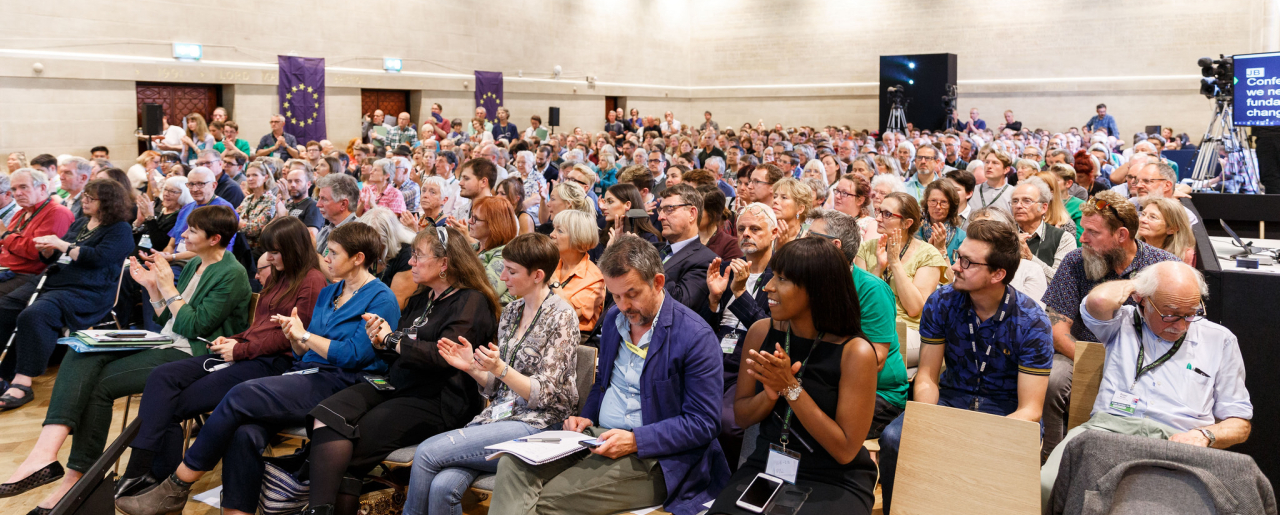The Green Party’s Holistic Review, which recommended changes to the party’s internal structures, has been voted on by members, with 70.19 per cent of participants voting in favour of the proposed changes.
The referendum saw 5,717 votes cast out of a total electorate of 35,469, giving a turnout of 16 per cent of eligible voters. 4,009 of those who cast their ballots voted for the changes, while 1,708 voted against.
The referendum required that a two thirds majority be achieved for the Yes outcome to pass, while a 15 per cent turnout was required for the vote to be quorate (valid).
It was decided in Autumn 2017, following that year’s Autumn Conference, to undertake a review of the Green Party’s internal structures and operations. The Holistic Review Commission was established to carry out the work required by the review.
The main changes to come out of the Review will be the establishment of a Council, a Political Executive (PEX) and a Board. The Council will be made up of 45 members and will oversee ‘all necessary decisions about strategy and activity’ in between party conferences – Conference will remain the supreme body of the Green Party. Members of the Council will be elected to the position of Chair or Co-Chairs.
The Council will be comprised of:
-
18 representatives from the regions of England (two each) and two representatives from the nation of Wales;
-
Five representatives of the Young Greens;
-
Five representatives from formally constituted affiliated groups within the Green Party that represent marginalised communities, including the current liberation groups;
-
Five representatives of elected councillors; and
-
10 directly elected members.
The Council will take on the current responsibilities of the Equality and Diversity Committee, Conferences Committee, the Policy Development Committee, International Committee, Campaigns Committee and the Green World Editorial Board. Work will be undertaken and fulfilled through time-limited Task and Finish Groups.
Decisions regarding political activities will be taken by the PEX, which would meet at least weekly, normally by electronic means, and be chaired by the Leader or Co-leaders of the Green Party. This PEX would include:
-
One representative of the Green Party’s MPs or Peers;
-
One representative of the Green Party’s MEPs (for as long as that role continues or should it be reinstated);
-
One of the Co-leaders/the Leader;
-
One of the Deputy Leaders/the Deputy Leader;
-
The Leader of the Wales Green Party;
-
One representative of the Association of Green Councillors;
-
The Chair or one of the Co-Chairs of Council; and
-
Four members elected directly by the membership.
A Board will be created to provide oversight of the party’s staff and legal responsibilities and will carry legal limited liability once it is introduced. It will consist of an elected Chair and Treasurer and five members appointed by Council after an open application process.
The Review also recommends the establishment of a regular survey of members, to take place no more than six times a year. This will allow the leadership to seek the views of members on current issues, allow party staff to engage with members regarding their satisfaction with processes and party systems, and allow Affiliated Organisations and working groups to seek views on areas of their work.
The Philosophical Basis will remain the foundational guide for the party, while the roles of the Standing Orders Committee, the Disciplinary Committee and the Disputes Resolution Committee will remain in their current forms.
These changes represent constitutional change for the Green Party, and it was decided at the Autumn Conference that a qualified lawyer will now have to be employed to draw up a new constitution, taking into account the changes recommended by the Holistic Review while ‘substantially maintaining’ all aspects of the current constitution not covered by the Holistic Review referendum proposal.
The new constitution will then be put to a delayed Spring 2019 conference (to be held after the local elections in May and before the end of June). This process will be overseen by a Transition Team, comprising three members of the Holistic Review Commission, two members of the Green Party Executive Committee and two members of the Green Party Regional Council.
The Transition Team will wind up by the time the new bodies are in place, handing over a final report to Autumn Conference 2019.
The recommendations of the Holistic Review are available to read in full for Green Party members on the Green Party members’ website.


